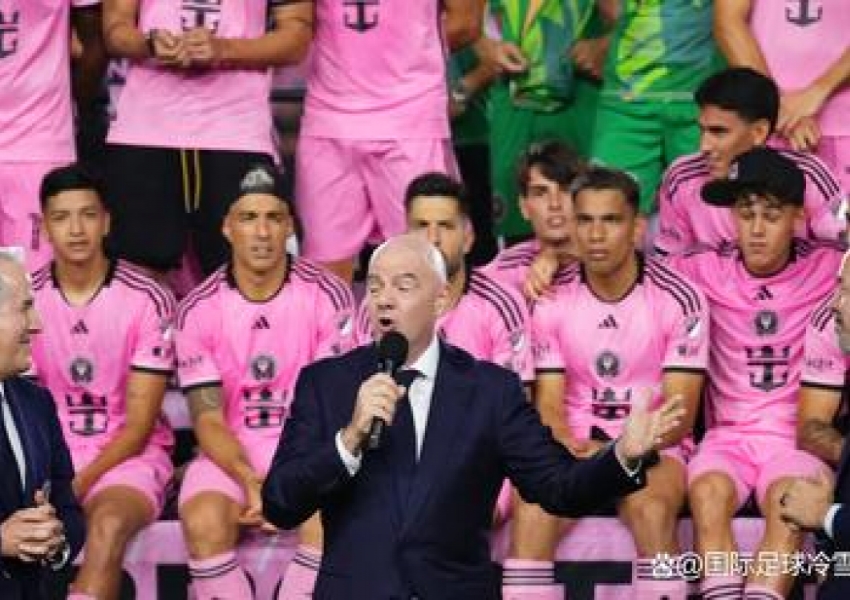Europe Cries Foul: Why Lautaro Martínez Was Snubbed by FIFA and What Infantino Might Be Scheming
FIFA’s recent announcement of its nominees for The Best FIFA Men’s Player and Coach Awards has sparked a storm of controversy across Europe. While some snubs have been accepted with relative understanding, others have ignited fiery debates. Among the latter is the omission of Lautaro Martínez from the 11-player shortlist for The Best FIFA Men’s Player, a decision that has left fans, analysts, and media outlets alike questioning the motives behind FIFA’s selection process.

Inter Milan’s head coach Simone Inzaghi, despite leading his team to a successful campaign, failed to make the cut for the top five coaching nominees. While disappointing, his exclusion is seen by many as justifiable, given the caliber of the competition. The list includes managers like Pep Guardiola, who despite a recent dip in form, led Manchester City to a historic fourth consecutive Premier League title earlier this year, and Xabi Alonso, who orchestrated Bayer Leverkusen’s remarkable triumph over Bayern Munich, a feat described as nothing short of epic.

Yet, it is the exclusion of Lautaro Martínez—a player whose achievements in 2024 rival those of any other on the shortlist—that has caused widespread outrage. To fully understand the magnitude of this snub, it is crucial to examine both Lautaro’s accomplishments and the motivations that may be driving FIFA’s decisions under the leadership of President Gianni Infantino.

A Season of Triumph and Impact
Lautaro Martínez’s 2024 season was nothing short of extraordinary. As the captain and talisman of the Argentine national team, he led his country to victory in the Copa América, emerging as the tournament’s top scorer and key figure in their success. His clinical finishing, leadership on the pitch, and ability to deliver in crucial moments made him the undeniable star of Argentina’s campaign.
Simultaneously, Lautaro spearheaded Inter Milan’s charge to the Serie A title, securing the club’s first Scudetto in three years. His goals, assists, and overall influence on the field were instrumental in Inter’s domestic dominance, making him one of the most impactful players in European football this year.
Despite these accomplishments, Lautaro was conspicuously absent from FIFA’s 11-player shortlist. The list includes Rodri, the Ballon d’Or winner, alongside other top contenders such as Vinícius Júnior (2nd in Ballon d’Or voting), Jude Bellingham (3rd), Dani Carvajal (4th), Erling Haaland (5th), Kylian Mbappé (6th), Lamine Yamal (8th), and Toni Kroos (9th). Lautaro, who finished 7th in Ballon d’Or voting, is the only player in the top nine to be excluded from FIFA’s shortlist.
This exclusion has led to widespread criticism from European media outlets, with many highlighting the inconsistency in FIFA’s criteria. Italian newspaper La Gazzetta dello Sport labeled the decision “absurd” and “a disgrace,” while French broadcaster RMC described it as “an insult to football.” Even British media, typically less concerned with Serie A, have weighed in, with The Mirror calling the snub “an embarrassment to the sport.”
Messi vs. Lautaro: A Controversial Inclusion
Adding fuel to the fire is the inclusion of Lionel Messi on the shortlist. While Messi remains one of the greatest players in football history, his 2024 campaign was far from stellar. Plagued by injuries, Messi missed significant portions of the year, sidelined for much of March, April, May, September, and October. His contributions to Argentina’s Copa América victory were limited, and his stint with Inter Miami in Major League Soccer (MLS) ended in disappointment with a first-round playoff exit.
Despite these setbacks, Messi found himself on FIFA’s shortlist, leading many to believe that his selection was based more on his global brand and marketability than his on-field performances. In contrast, Lautaro, who consistently delivered in both club and international competitions, was left out.
Even Messi himself has expressed support for Lautaro. In the lead-up to the Ballon d’Or ceremony, Messi publicly stated that Lautaro deserved to win the award, and following Lautaro’s 7th-place finish, he reiterated his belief that his compatriot was one of the most deserving players of the year. Yet, FIFA’s decision to include Messi while excluding Lautaro has raised questions about the organization’s true motivations.
The Infantino Factor: A Political Play?
To understand the potential reasons behind FIFA’s decision, it is essential to consider the broader context of Gianni Infantino’s leadership and the organization’s strategic goals. According to a report from The Mirror, Infantino’s recent focus has been on expanding FIFA’s influence in the American market, a move highlighted by his close involvement with Inter Miami and MLS.
During the 2024 MLS season, Infantino made headlines by personally attending Inter Miami matches and even acting as a DJ at DRV PNK Stadium, announcing the club’s controversial invitation to the newly expanded FIFA Club World Cup. This decision, which bypassed traditional qualification criteria, sparked backlash within American soccer circles, with many MLS teams criticizing the favoritism shown towards Inter Miami.
The report suggests that Infantino’s actions are driven by financial concerns. FIFA’s new Club World Cup format, set to debut in 2025, has faced numerous challenges, including lower-than-expected broadcasting revenues, sluggish ticket sales, and a lack of commercial partners. Additionally, the tournament has drawn criticism from players’ unions across Europe, with many voicing concerns about the increased workload and lack of rest for players.
Infantino, it seems, views Messi as a crucial asset in promoting the Club World Cup and boosting its commercial appeal. By elevating Messi’s profile and ensuring his participation in the tournament, FIFA aims to attract higher broadcasting fees, increase ticket sales, and secure more sponsorship deals. In this context, Lautaro Martínez’s exclusion can be seen as a political sacrifice—a calculated move to maximize Messi’s marketability and mitigate the financial risks associated with the tournament.
Marotta’s Outrage and Inter’s Dilemma
Inter Milan CEO Giuseppe Marotta has not hidden his disappointment with FIFA’s decision. In a scathing statement, Marotta described Lautaro’s exclusion as “shocking and disrespectful,” emphasizing the player’s contributions to both club and country. “Lautaro’s exceptional performances helped Inter achieve historic success and led Argentina to Copa América glory. He was the top scorer in both competitions, and his influence in key matches cannot be ignored,” Marotta said.
While the snub is undoubtedly a blow to Lautaro’s personal recognition, it also highlights a broader issue for Inter Milan. The club, facing financial constraints, is heavily reliant on revenue from international competitions like the Club World Cup. Any disruption to the tournament’s financial success could have significant consequences for Inter’s financial stability.
As European football continues to grapple with the implications of FIFA’s decisions, one thing is clear: Lautaro Martínez’s exclusion has not gone unnoticed. Whether driven by politics, economics, or a combination of both, FIFA’s decision has left many questioning the integrity of one of football’s most prestigious awards. For Lautaro, the snub may serve as motivation to continue proving his worth on the pitch. But for fans and analysts, it remains a glaring example of how off-field calculations can overshadow on-field achievements.
Copyright Statement:
Author: mrfootballer
Source: Mrfootballer
The copyright of this article belongs to the author. Reproduction is not allowed without permission.
Recommended Blog
- Champions League Overhaul Amplifies Inter Milan’s Advantages as Inzaghi’s Secret Weapon Shines
- Champions League Matchday 5: AC Milan Approaches Favorable Schedule While PSG Drifts from Elite Status
- Leipzig’s Perfect Away Record Against Serie A Teams: Inter Milan Faces Another European Nemesis
- Inter’s Final Push for Defensive Reinforcement: Pursuing Pavard While Eyeing Premier League Alternatives
- Inter Milan’s Pursuit of Pavard: €30 Million Bid Still Falls Short, Two Exits on the Horizon
- Inter Milan's Sixth Midfielder Dilemma Unveils a Bigger Challenge: The Truth Behind Their Defensive Reinforcements
- Is Inter's New Striker Really the Weakest Link? Thuram's 259 Minutes Reveal Two Key Strengths
- UEFA Super Cup Preview: Manchester City’s Commitment in Doubt, Sevilla Eyes Revenge
- Five Major Setbacks Disrupt Inter Milan’s Defensive Reinforcement: Inzaghi’s Final Demand to Define Summer Window Rating
- Champions League Third Qualifying Round Second Leg: Marseille's New Signings Raise Concerns, Copenhagen's Tactical Discipline Stands Out
Hot Blog
- Champions League Quarterfinals Set: Arsenal Crush PSV 9-3, Villa Dominate Brugge 6-1! Real Madrid vs. Arsenal Confirmed
- Champions League Drama: Rare Penalty Violation! VAR’s Eagle Eye Turns 60,000 Cheers to Silence
- Vinícius Jr. Misses Crucial Penalty as Atlético Fans Erupt – Bellingham Offers Consolation in Madrid Derby Thriller
- Real Madrid Survive Atlético Thriller: Win 4-2 on Penalties to Set Up Quarterfinal Clash with Arsenal
- 1-4! 0-4! A Dark 24 Hours for Chinese Football – Shanghai’s Giants Humiliated and Eliminated from the AFC Champions League
- 4 AM Showdown: Manchester United’s Do-or-Die Battle – Defeat Means Elimination and a Trophyless Season
- Man City’s 21-Year-Old Star Returns Home as a Hero! Receives $350,000 Mercedes, Gifts It to His Father
- AFC Champions League Quarterfinal Draw: Yokohama Faces CR7! Two High-Stakes Clashes as Japan’s Duo Battle in the Bottom Half
- Barça Unleashed: 26-Minute, 4-Goal Comeback Stuns Atlético as Flick’s Masterclass Makes History
- A Night of Triumph and Heartbreak: Barça’s Epic Comeback, Liverpool’s Cup Final Agony, and Leverkusen’s Stunning Reversal